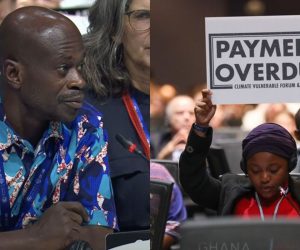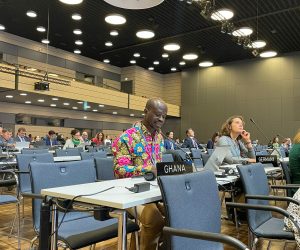
Climate Vulnerable Forum Leaders Dialogue COP26
4:15 – 6:15 pm 2 November 2021 – UNFCCC COP26, Glasgow, Scotland
Intervention by H.E. Javier Antonio Gutiérrez Ramírez
Nicaragua’s Vice Minister of Environment and Natural Resources
Companion
Commander Daniel Ortega Saavedra
President of the Republic of Nicaragua
Brother Sheikh Hasima
Prime Minister of the Republic of Bangladesh
Chair of the Climate Vulnerability Forum
Dear Ministers, Deputy Ministers, Heads of Delegations of COP 26, friends all.
- We would like to thank on behalf of the people and Government of Nicaragua the invitation to such a relevant Forum, where we share common approaches to face the climate crisis.
- The root of the problem is that the great capitalist economies, through destructive models of production and consumption, have caused an accelerated climate crisis, Climate Change has become history, today we face climate crisis, which is also a planetary crisis and a crisis of values due to the lack of Christian principles and solidarity.
- We face a complex moment in an overwhelmingly polluted planet while our “Mother Earth” agonizes over savage capitalism, carbon dioxide concentrations are reaching the highest percentages seen in the last 2000 years, we are at 420 Parts Per Million (maximum norm 320 ppm), more than 59 billion tons of carbon dioxide are being emitted into the atmosphere (maximum norm 14 billion), and we are already reaching a global temperature increases of 1.1 orC.
- Nicaragua said at COP 21 in 2015 that the Paris Agreement would lead us to a “Climate Crisis” because it did not represent a responsible commitment of those countries who are mostly responsible for climate change, nor were the means of implementation to protect our peoples assured. 6 years later, in 2021, the first report of the United Nations scientists confirms that global warming will trigger turning points in the earth’s natural systems generating widespread and irrevocable disasters, unless urgent measures are taken by developed countries.
- Nicaragua has not caused the Climate Crisis, nor has Central America, nor the countries that make up this Climate Vulnerability Forum, it is the large economies who own the historical responsibility because they have been applying consumption and production models based on the destruction and pollution of Mother Earth.
- Therefore, we must uphold the Principle of Common but Differentiated Responsibilities and Respective Capabilities as the foundation for Climate Justice and Reparation policy.
- The Government of Reconciliation and National Unity Nicaragua has historically been consistent in its policy of protection and defense of our Mother Earth, we were the first signatory country to the “Universal Declaration of the Common Good of the Earth and Humanity” in 2010; and from the National Human Development Plan 2009-2011, to the National Plan to Fight Poverty and for Human Development 2022-2026, we have reaffirmed our commitment to the protection and defense of Mother Earth.
- Nicaragua adhered to the Paris Agreement in 2017, committing to strengthen the interests of the most vulnerable countries and align its policies, strategies and government instruments, in order to contribute to the goal of limiting the global temperature by 1.5 degrees Celsius.
- A few weeks ago, and as an effective demonstration of our commitment to climate objectives, we formalized the goal of our government to be part of the Climate Vulnerability Forum.
- The political and financial efforts made by our countries are not and will not be sufficient if developed countries do not seriously commit themselves to changing their patterns of production and consumption in order to stop in time the climate catastrophe that humanity is facing and that has been confirmed by science.
- In the midst of the climate crisis, a new global evil is breaking out, the COVID-19 pandemic, which increases the vulnerabilities of developing countries, and in particular those in central America and the Caribbean who are constantly hit by extreme and frequent weather events.
- Both the climate and health crises show the real and historical structural debts and inequalities between the global north and the global south, which are the main threats to promote actions to adapt to climate change and to the fulfillment of the 2030 development agenda, to which our governments committed.
- Although Nicaragua’s greenhouse gas emissions barely represent 0.02% of global emissions, our country is highly sensitive to the impacts of climate change, and the gap to face this vulnerability represents two billion dollars annually, according to a study by ECLAC’s Climate Change Economics, this cannot be solved without the additional and incremental resources of Official Development Assistance.
- It is of utmost importance to note that 10 of the countries who are responsible for the highest emissions represent 83% of global emissions, while 100 of the countries with the lowest emissions represent only 3%, among then Nicaragua.
- In addition, we are currently facing the negative impacts caused by the failed coup attempted in 2018, and the losses and damages produced by the passage of the ETA and IOTA Huracanes in 2020, valued at approximately 30 billion dollars (2.3 times the nominal GDP of Nicaragua in 2020).
- In these circumstances, all efforts in the fight against poverty of our Government, which includes climate action as a fundamental axis, will be compromised if a global commitment to climate justice is not achieved under the Principle of Common but Differentiated Responsibilities and Specific Actions, without unilateral and illegal coercivemeasures that do not contribute to achieving significant progress before 2030.Brothers and Sisters representing the states that make up the Climate Vulnerability Forum,
- Nicaragua, in its tireless fight to facilitate climate negotiations and peace in the world, submitted to the consideration of the United Nations World Convention on Climate Change in the context of COP 26 four declarations, which ratify the commitment of our Government, these are:
- Urgent call to preserve and recover forests as the best way to face climate change.
- The prevailing need to raise financing to address loss and damage from extreme weather events to the level of importance of mitigation and adaptation
- To declare that Central America and the Caribbean are highly vulnerable regions; and
- Climate Justice with reparations according to historical responsibilities.
- We also strongly insist on the commitment of developed countries to provide financing to developing countries, which guarantees the transfer of technology and the strengthening of capacities to reduce the vulnerabilities we face.
- This is a new collective post-2025 funding target, quantified from the mobilization target of $100 billion per year and urgently needed to be pushed.Brothers and Sisters,
- Despite that the financial gap to face the multiple vulnerabilities that afflict Nicaragua represents at least two billion dollars annually, for our government the main tool to reduce them is none other than the fight against poverty, which is one of our political priorities as well as climate action.
- We will continue with sustained efforts to achieve good living for Nicaraguans, but we will as well continue to insist in front of the international community on the urgency of promoting climate justice and thus move collectively and forcefully towards the achievement of climate objectives and the fulfillment of the 2030 development agenda.
- From this forum at COP 26, in Glasgow, Scotland, our delegation will insist on the responsibility of developed countries to reduce emissions, as well as on the commitment to mobilize sufficient and predictable resources for the financing of adaptation measures and the reduction of the impact of loss and damage caused by extreme weather events.
- We will also contribute to eradicate the idea from developed countries that climate vulnerable countries are a national security threat to them. Stigmatization does not allow us to make sustained progress in our effort to adapt and build resilience.
- On the contrary, our States and Governments, together, will be able to overcome their vulnerabilities with transparent financial and technical cooperation, without conditions or unilateral coercive measures that do nothing more than jeopardize the development objectives that we promote from our States, with sovereignty and self-determination.
I thank you,
SHARE ON
Related News
04
Jun
Ghana CVF Statement for the Closing of the Glasgow Dialogue on Loss and Damage
56th Session of the UNFCCC Subsidiary Bodies
Ghana CVF Statement for the Closing of the Glasgow Dialogue on Loss and ...
30
Nov
Dr. Antwi Boasiako Amoah speaks on behalf of Ghana and the Climate Vulnerable Forum at the Opening Plenary of COP28
Statement given by Dr. Antwi Boasiako Amoah, Director, Climate Vulnerabilities and Adaptation, Environmental Protectio...
05
Jun
Ghana CVF Presidency Statement for the Opening Plenary of the 58th Session of the UNFCCC Subsidiary Bodies
58th Session of the UNFCCC Subsidiary Bodies
Ghana CVF Presidency Statement for the Opening Plenary
...



